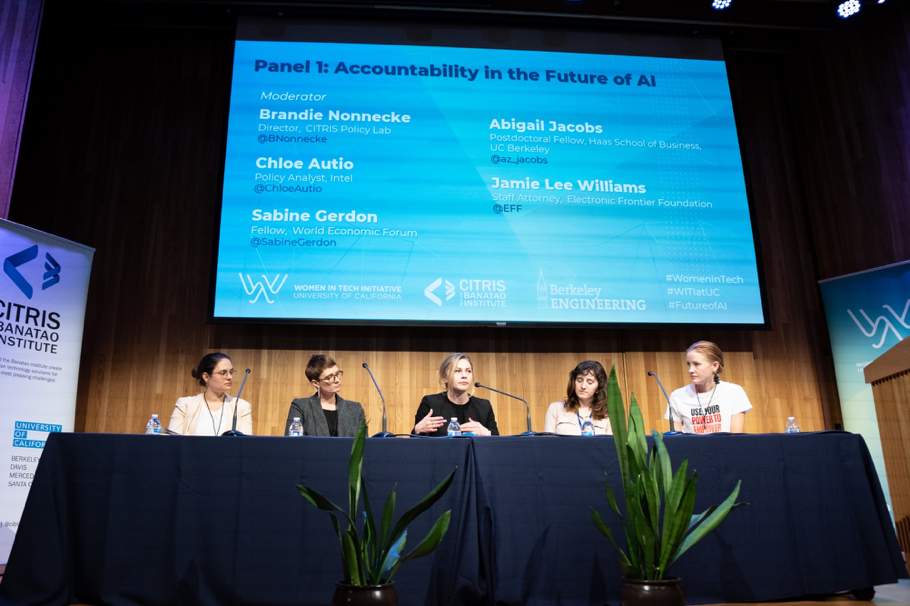By Chasiri Sherron. I met Jill Finlayson on the UC Berkeley campus, at the headquarters of the Center for Information Technology Research in the Interest of Society (CITRIS) and the Banatao Institute. “Have you been here before? It’s pretty awesome,” she said. The headquarters contain labs, research centers, and state-of-the-art classrooms and conference rooms for faculty, students, and startups to develop innovative ideas. Recent projects are on display at the in-house Tech Museum.
 Finlayson is director of the Women in Tech Initiative at CITRIS. Founded in 2017, Women in Tech Initiative encourages everyone to get involved in pushing for greater diversity in tech. Finlayson’s journey to Women in Tech Initiative began nine years ago with a tweet from Tech Women that invited women in the Silicon Valley tech community to join them as volunteers. Finlayson’s years of experience with Bay Area startups inspired her to sign up and she has continued to mentor ever since. Tech Women is a federal program designed to mentor women from around the world in collaboration with U.S. tech companies.
Finlayson is director of the Women in Tech Initiative at CITRIS. Founded in 2017, Women in Tech Initiative encourages everyone to get involved in pushing for greater diversity in tech. Finlayson’s journey to Women in Tech Initiative began nine years ago with a tweet from Tech Women that invited women in the Silicon Valley tech community to join them as volunteers. Finlayson’s years of experience with Bay Area startups inspired her to sign up and she has continued to mentor ever since. Tech Women is a federal program designed to mentor women from around the world in collaboration with U.S. tech companies.
That involvement with Tech Women contributed to her decision to refocus her professional work around helping women and promoting more equitable workspaces. So, as a UC Berkeley alumnus, she jumped at the opportunity to return to Cal as director of Women in Tech Initiative and link its faculty and students to the local tech and startup ecosystem.
Since its founding by Tsu-Jae King Liu, the dean of Berkeley’s College of Engineering, and Camille Crittenden, CITRIS executive director, Women in Tech Initiative’s goal has been to “increase the participation, persistence, and advancement of women in tech fields,” Finlayson said. They do this through research, student programs, Leadership Round Tables with the corporate sector, and the annual Women in Tech Symposium that features the Athena Awards, which recognize leaders in tech, equity, and inclusion.
Working with the College of Engineering and Round Table participants, Women in Tech Initiative helped develop a corporate inclusion survey. Tech employers share various practices, such as tracking metrics and adopting hiring processes and policies that support equity in the workplace. Their responses help students starting their job search to learn more about employers and find inclusive workplaces. Finlayson pointed out that the college has been very proactive in promoting belonging at Cal and recently launched a new EMPOWER program designed “to support faculty, staff and students who want to foster an inclusive climate by actively promoting practices that advance equity for all members of our engineering community.“
In addition to working with the College of Engineering, Women in Tech Initiative collaborates with other campus departments and student groups, which allows the initiative to have broader impact. For example, it recently collaborated with Big Ideas and Begin.Berkeley to design an easily accessible database of innovation resources for women, people from underrepresented communities, and others. The Innovation Resource Database was developed with the help of students in a computer science course. Now live, the search-engine tool allows people to filter data and find things like mentorship opportunities, events, and possible funding. The City of Berkeley now also links to these resources.
New for Women in Tech Initiative last semester was a student-led class at UC Berkeley called Inclusive Pathways into Tech and Entrepreneurship, which was started by graduate student Nicole Cotton. The course taught students from all majors different pathways into the tech industry, and how to use technology to drive social change. It aimed to make the tech industry accessible to those without a technical background.
Among Women in Tech Initiative’s greatest challenges is increasing male participation. Finlayson said, “We need men in the audience. We need men participating as advocates, as sponsors, as mentors, as allies, working on these issues. And when men participate in these programs, they become better twenty-first century leaders.”
Finlayson is supporting UC’s other CITRIS campuses – UC Merced, UC Davis, and UC Santa Cruz – in developing their own Women in Tech initiatives. Merced, for example, is using a Google Explore grant to start a three-day workshop, called “Valle de Exploracion: Find Your Path to a Tech Career,” for students from UC Merced, Merced College, and Cal State Stanislaus. CITRIS has an existing ethos of inclusion and interdisciplinary collaboration and Finlayson believes programs like Women in Tech Initiative help support the drive toward innovation for everyone and by everyone.
When asked what the UC IT community can do to support diversity and inclusion, she recalled the “aha moment” she had years ago while mentoring with Tech Women. She said everyone can find opportunities to mentor and be mentored within the workplace. These partnerships help create opportunities and change the culture in existing STEM environments.
 Chasiri Sherron is a UC Berkeley student and an IT marketing and communications intern, Information Technology Services, UC Office of the President.
Chasiri Sherron is a UC Berkeley student and an IT marketing and communications intern, Information Technology Services, UC Office of the President.

